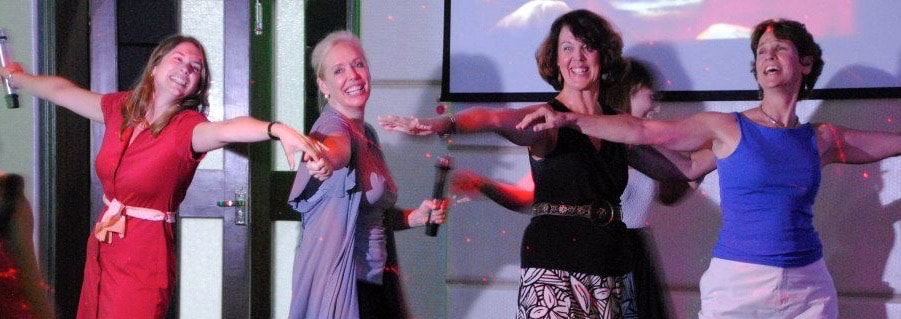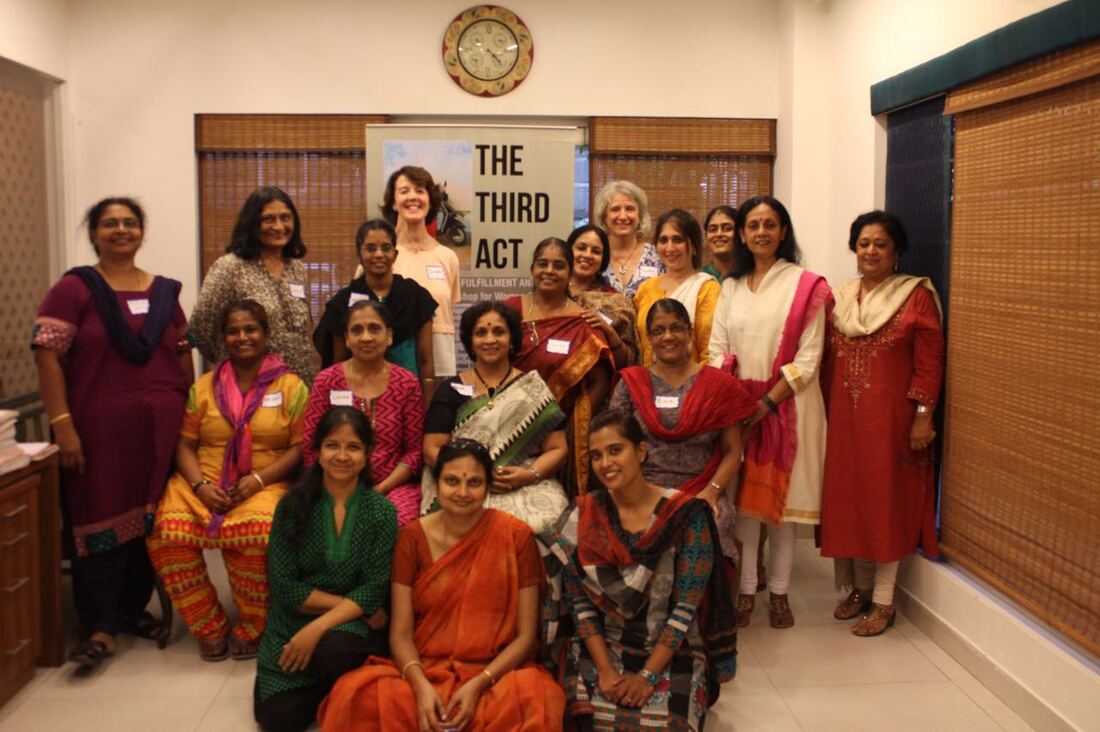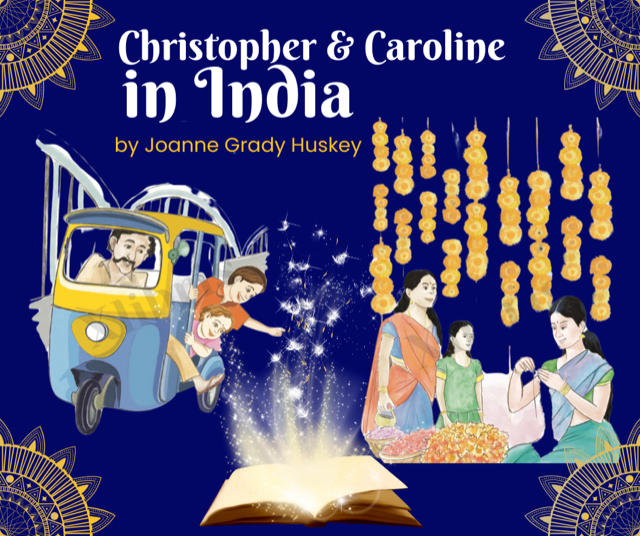 The Third Act: Finding Meaning, Joy and Fulfillment Over 50 by Joanne Grady Huskey and Kimberly Weichel Ours is the first generation of women who have had careers for much of our lives. We are living fuller lives than most of our parents and grandparents could imagine. Because we are living longer, we are entering a period of life that is virtually uncharted, a time in which many of us are free from social expectations and reduced family obligations, with the freedom, resources and desire to engage in new activities with meaning and purpose. Some refer to this phase as the “Encore” stage, and we call it the Third Act. Our growing up years constitute the first act, our middle years focused on career and family is considered our second act, and for many of us our third act is really ours to create. Science and medical advances have extended our years with generally better health than previous generations. We realize, however, that this time is limited; it may be our last chance to realize our dreams or live the life we have always wanted. Hopefully, most of us have saved money for our retirement years and are in good health. If we are intentional about what we do with our time, we have the opportunity to turn our dreams into realities, to consider options previously considered impractical or unattainable. It's up to us to decide and plan for our continued vitality. In fact, for many today, retirement is a “roleless” role. The traditional notion of retirement fits with a worn out notion of aging that conceives of it primarily in terms of disengagement and decline; but today “old” is being redefined as a time of vitality and increased happiness. More Americans 65 and older work today than ever before, partly due to financial reasons and partly because they are physically able to work due to continuing good health. With 30 or more years left to live, we have an opportunity to create a better quality of life, leave a legacy, contribute to society in a meaningful way, enjoy the simple pleasures of life, or pursue our life-long dreams. The years beyond 50 offer exciting opportunities and infinite possibilities. Yet, this less structured time of choice can also be frustrating and overwhelming if we have not adequately planned for it. To begin to prepare for our Third Act, it is helpful to review the assumptions, patterns, and beliefs that we held in work and career, hobbies, family, volunteer activities and social life by asking the following questions: Which ones serve you and which get in your way from doing your best? What relationships, job and other commitments are a drain and not life enhancing? What made you most happy and satisfied in the first part of our life? What skills do you enjoy using and which new ones do you want to learn? Do you want to make a contribution to your community or society? Taking stock of your second act, and making changes where necessary, is an important step in moving fully into your Third Act. Science tells us that our aging is influenced by our attitudes and lifestyle. The good news is that we can make changes that will enhance our lives. We have found it helpful to raise questions and examine our current lives-- the physical, emotional, professional, personal and spiritual dimensions—to clarify for ourselves what makes us feel most fulfilled. This self knowledge will aid us in launching a satisfying Third Act. Physical We know that many of us may have two, three or more decades of life remaining and that each generation is more active with better health and increased vitality than before. Average life spans are increasing – by 2050 women’s lifespan is projected to be 89 – 94 and men’s 83-85. The number of people over 100 continues to rise. Yet, in our second act, we also may have neglected our fitness, gained some weight and find our cholesterol or blood pressure too high for good health. Now is a good time to take stock of our current health and fitness and develop a plan for wellness. This may include losing weight, quitting smoking, improving our diet or getting more exercise. An AARP survey conducted in 2013 states that one’s health is the biggest driver of satisfaction in later life. Emotional Popular stereotypes would lead us to believe that most of us go through a midlife crisis between 40 and 70 leading to unhappiness and depression. Yet researchers who have been studying the development process report that, far from being a time of dissatisfaction and dread of getting old, only a small percent of participants report having a midlife crises. A recent book entitled The Happiness Curve: Why Life Gets Better After 50 by Jonathan Rauch states that most people are entering their sixth or seventh decades with an increased feeling of well-being, equanimity, a sense of control over many parts of their lives and feeling younger than their years. Many report less stress and the freedom to make choices in how they spend their time. A 2013 AARP Attitudes of Aging study reported that the majority of those who have already retired are satisfied with their lives. These studies suggest that aging is not the dreaded time of our imaginations, but rather with intention and focus we can create a joyful and satisfying Third Act. Professional Many of us have pursued careers for most of our lives which have brought achievements and the personal and financial rewards of success in our chosen fields; for others, the demands of family life were all consuming. Yet career success often involved the stressful demands of long hours and hard work to meet expectations or challenge traditional stereotypes. Many women did both – raising a family and pursuing a career. Many of us are ready to “slow down”, have more time for relaxation and enjoy other interests. Yet some seniors do not want to quit or financially can’t afford to, and rotate between work and leisure. Others of us, a startling 56%, want to leave one career behind and launch a new and perhaps more entrepreneurial venture that we have always dreamed about. Some want to use our professional skills to volunteer in our community or beyond. The 2013 AARP Attitudes of Aging survey found that the more one believes their life has made a difference, the more satisfied one is with their life. This is a time to examine whether we want to continue to work, do something new, and/or volunteer using our skills and experience. Personal Full time work, raising a family, or taking care of loved ones, leaves little time for women to pursue hobbies, leisure time activities or make contributions as a volunteer. As our family obligations are reduced and we think of working part time or retiring, new opportunities open up. We can pursue long delayed dreams, complete neglected projects, learn to play the piano or speak Spanish, study history, enjoy the simple pleasures of life, or make a meaningful contribution to causes about which we are passionate. We can evaluate our skills and experience to find ways that we can make a difference or contribute to our community. Are there new skills we need to learn to pursue our dreams? Spiritual
The multi-tasking, over-scheduled life cruising on auto-pilot leaves little time to explore the questions of deeper meaning in our lives. We may be disenchanted with the “rewards” of climbing the corporate ladder or have felt overwhelmed with family obligations. When we finally do have time, we are often at a loss, drifting and feeling somehow empty of purpose and direction. Many people feel that given the stressful demands during their second act, they have to set aside something important that they want to retrieve. For example, some put off taking piano lessons, writing that book, or taking that trip. Experts suggest that the changes that matter during the third act of life are often spiritual and psychological. What are we called to do that will provide meaning and purpose in this next phase of our life? Do we have contemplative or spiritual practices that guide us? Planning our transition to our Third Act involves being proactive, taking personal responsibility and being open to learning about ourselves. It’s important to identify and support our own needs and keep them in balance with the wishes and expectations of others. This may involve setting some boundaries, or reducing our tendency to be reactive. Dr. Martin Seligman, the father of popular psychology, has done research on ways to increase happiness as we age by using 4 strategies: Positive Appreciation: Positive appreciation means being grateful for the present moment, looking back with contentment and looking ahead with optimism. Mindfulness is one way to increase positive feelings and enjoy the present by actively noticing things without evaluating or categorizing them. Gratitude exercises, thinking about or writing down what you are grateful for, have been shown to not only lift your mood, but also improve physical health and raise energy levels. Seeking Meaning: Finding meaning in our lives is an important component of satisfaction. Transcending the self and using our signature strength to belong or serve something larger than ourselves, through involvement in a cause for which we have passion, is an important component of happiness. It may involve nature, art, community, spirituality, or something else. Giving makes us feel good, frequent acts of kindness boost well-being, volunteering gives us a sense of purpose. Active Engagement: Rowe and Kahn’s Model of Successful Aging includes being engaged in life as a key component in successful aging. We are more likely to be in “flow” when we are actively using our skills and focus. When the structure and goals of our second act are no longer provided for us through work, we may need to do some research as to where and how best to use our skills and experience at this time of life. Quality of Everyday Experience. While traditional approaches to life planning often emphasize the importance of vision and goals, it is clear that the quality of our everyday experience is an important determinant of satisfaction. The simple pleasures of leisurely reading the paper, calling a friend, having a cup of tea or taking a walk in nature can bring daily contentment. Savoring sensory experiences increases the pleasure of our daily lives. Most significantly, a Harvard University longevity study showed that having strong ties to friends and family is the key determinant to a happy life. “Close relationships, more than money or fame, are what keep people happy throughout their lives, the study revealed. Those ties protect people from life’s discontents, help to delay mental and physical decline, and are better predictors of long and happy lives than social class, IQ, or even genes.” (https://news.harvard.edu/gazette/story/2017/04/over-nearly-80-years-harvard-study-has-been-showing-how-to-live-a-healthy-and-happy-life/) We have found that living a positive Third Act with intention can be a satisfying and meaningful time of our lives. Now is the time to pursue dreams and interests that we have time for and use our accumulated experience and wisdom to shape a vital, engaging phase of our lives. Authors Joanne Grady Huskey and Kimberly Weichel are cross cultural trainers, authors, and specialists in women’s leadership. They offer workshops in Third Act development and use their expertise and life experience to support others in creating their own Third Acts.
0 Comments
Leave a Reply. |
Archives
January 2024
Categories |
© 2021 Joanne Grady Huskey

Christopher & Caroline in India
Written by Joanne Grady Huskey, Illustrated by Shakkeela Manoj and Ratheesh Kumar.
Available on Amazon!
Give the world to the little ones in your life by taking them on a journey to India. Experience the rich cultures, foods, and wonderful traditions through the eyes of my two little children growing up in Madras.
Now available on Amazon Books - Christopher and Caroline in India
Continue the journey to a new continent with Christopher & Caroline in Kenya, also available on Amazon!
Written by Joanne Grady Huskey, Illustrated by Shakkeela Manoj and Ratheesh Kumar.
Available on Amazon!
Give the world to the little ones in your life by taking them on a journey to India. Experience the rich cultures, foods, and wonderful traditions through the eyes of my two little children growing up in Madras.
Now available on Amazon Books - Christopher and Caroline in India
Continue the journey to a new continent with Christopher & Caroline in Kenya, also available on Amazon!


 RSS Feed
RSS Feed
